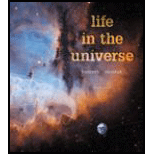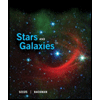
Pearson eText Life in the Universe -- Instant Access (Pearson+)
4th Edition
ISBN: 9780135234457
Author: Jeffrey Bennett, Seth Shostak
Publisher: PEARSON+
expand_more
expand_more
format_list_bulleted
Concept explainers
Question
Chapter 3, Problem 16RQ
To determine
Describe the spectroscopy.
Expert Solution & Answer
Want to see the full answer?
Check out a sample textbook solution
Students have asked these similar questions
Required information
Two speakers vibrate in phase with each other at 523 Hz. At certain points in the room, the sound waves from the two
speakers interfere destructively. One such point is 1.45 m from speaker #1 and is between 2.00 m and 4.00 m from
speaker #2. The speed of sound in air is 343 m/s.
How far is this point from speaker #2?
m
a) Consider the following function, where A is a constant.
y(x,t) = A(x — vt).
Can this represent a wave that travels along? Explain.
b) Which of the following are possible traveling waves, provide your reasoning and give the velocity of the
wave if it can be a traveling wave.
e-(a²x²+b²²-2abtx
b.1) y(x,t)
b.2) y(x,t)
=
=
A sin(ax² - bt²).
2
b.3) y(x,t)
=
A sin 2π
(+)
b.4) y(x,t)
=
A cos² 2π(t-x).
b.5) y(x,t)
=
A cos wt sin(kx - wt)
The capacitor in (Figure 1) is initially uncharged. The switch is closed at t=0. Immediately after the switch is closed, what is the current through the resistor R1, R2, and R3? What is the final charge on the capacitor? Please explain all steps.
Chapter 3 Solutions
Pearson eText Life in the Universe -- Instant Access (Pearson+)
Ch. 3 - List three major ideas of astronomy that help...Ch. 3 - Briefly define and describe each of the various...Ch. 3 - Describe the solar system as it looks on the...Ch. 3 - Prob. 4RQCh. 3 - Prob. 5RQCh. 3 - Prob. 6RQCh. 3 - Prob. 7RQCh. 3 - What do we mean when we say that Earth and life...Ch. 3 - Imagine describing the cosmic calendar to a...Ch. 3 - Prob. 10RQ
Ch. 3 - Prob. 11RQCh. 3 - Prob. 12RQCh. 3 - What is the difference between matter in the...Ch. 3 - Define and give examples of kinetic energy,...Ch. 3 - Prob. 15RQCh. 3 - Prob. 16RQCh. 3 - Briefly describe the four major features of our...Ch. 3 - Briefly describe the nebular theory and how it...Ch. 3 - What was the close encounter hypothesis for our...Ch. 3 - How have recent discoveries led scientists to...Ch. 3 - Prob. 21TYUCh. 3 - At a middle school talent show, 14-year-old Sam...Ch. 3 - SETI researchers announced today that if they...Ch. 3 - A noted physicist today announced that he has...Ch. 3 - Prob. 25TYUCh. 3 - Astronomers have discovered a galaxy in the far...Ch. 3 - Inventor John Johnson has patented a device that...Ch. 3 - Prob. 28TYUCh. 3 - Prob. 29TYUCh. 3 - Using new, powerful telescopes, biologists today...Ch. 3 - Prob. 31TYUCh. 3 - Prob. 32TYUCh. 3 - A television advertisement claiming that a product...Ch. 3 - When we say the universe is expanding, we mean...Ch. 3 - Prob. 35TYUCh. 3 - The age of our solar system is about (a) one-third...Ch. 3 - Prob. 37TYUCh. 3 - How many of the planets orbit the Sun in the same...Ch. 3 - Prob. 39TYUCh. 3 - Prob. 40TYUCh. 3 - Explaining the Past. Is it really possible for...Ch. 3 - A Strange Star System. Suppose that we discovered...Ch. 3 - Prob. 44IFCh. 3 - Alien Technology. Some people believe that Earth...Ch. 3 - Atomic Terminology Practice. a. The most common...Ch. 3 - Prob. 49IFCh. 3 - Prob. 50IFCh. 3 - Patterns of Motion. In one or two paragraphs,...Ch. 3 - Two Kinds of Planets. The jovian planets differ...Ch. 3 - Pluto and Eris. How does the nebular theory...Ch. 3 - Rocks from Other Solar Systems. Many leftovers...Ch. 3 - Prob. 55IFCh. 3 - Prob. 56IFCh. 3 - Scale of the Solar System. The real diameters of...Ch. 3 - Prob. 58IFCh. 3 - Prob. 59IFCh. 3 - Prob. 60IFCh. 3 - Prob. 61IFCh. 3 - Prob. 62IFCh. 3 - Prob. 63IFCh. 3 - Prob. 67WPCh. 3 - Tour of the Solar System. Visit one of the many...
Knowledge Booster
Learn more about
Need a deep-dive on the concept behind this application? Look no further. Learn more about this topic, physics and related others by exploring similar questions and additional content below.Similar questions
- Suppose you have a lens system that is to be used primarily for 620-nm light. What is the second thinnest coating of fluorite (calcium fluoride) that would be non-reflective for this wavelength? × nm 434arrow_forwardThe angle between the axes of two polarizing filters is 19.0°. By how much does the second filter reduce the intensity of the light coming through the first? I = 0.106 40 xarrow_forwardAn oil slick on water is 82.3 nm thick and illuminated by white light incident perpendicular to its surface. What color does the oil appear (what is the most constructively reflected wavelength, in nanometers), given its index of refraction is 1.43? (Assume the index of refraction of water is 1.33.) wavelength color 675 × nm red (1 660 nm)arrow_forward
- A 1.50 μF capacitor is charging through a 16.0 Ω resistor using a 15.0 V battery. What will be the current when the capacitor has acquired 1/4 of its maximum charge? Please explain all stepsarrow_forwardIn the circuit shown in the figure (Figure 1), the 6.0 Ω resistor is consuming energy at a rate of 24 J/s when the current through it flows as shown. What are the polarity and emf of the battery E, assuming it has negligible internal resistance? Please explain all steps. I know you need to use the loop rule, but I keep getting the answer wrong.arrow_forwardIf you connect a 1.8 F and a 2.6 F capacitor in series, what will be the equivalent capacitance?arrow_forward
- Suppose that a particular heart defibrillator uses a 1.5 x 10-5 Farad capacitor. If it is charged up to a voltage of 7300 volts, how much energy is stored in the capacitor? Give your answer as the number of Joules.arrow_forwardThe voltage difference across an 8.3 nanometer thick cell membrane is 6.5 x 10-5volts. What is the magnitude of the electric field inside this cell membrane? (Assume the field is uniform, and give your answer as the number of Volts per meter... which is the same as the number of Newtons per Coulomb.)arrow_forwardThree identical capacitors are connected in parallel. When this parallel assembly of capacitors is connected to a 12 volt battery, a total of 3.1 x 10-5 coulombs flows through the battery. What is the capacitance of one individual capacitor? (Give your answer as the number of Farads.)arrow_forward
- Suppose you construct your own capacitor by placing two parallel plates at a distance 0.27 meters apart. The plates each have a surface area of 0.64 square meters. What is the capacitance of this setup? (Give your answer as the number of Farads.)arrow_forwardDraw a diagram with the new arrows. No they do not point all towards the center.arrow_forwardExample In Canada, the Earth has B = 0.5 mŢ, pointing north, 70.0° below the horizontal. a) Find the magnetic force on an oxygen ion (O2) moving due east at 250 m/s b) Compare the |FB| to |FE| due to Earth's fair- weather electric field (150 V/m downward).arrow_forward
arrow_back_ios
SEE MORE QUESTIONS
arrow_forward_ios
Recommended textbooks for you
 Foundations of Astronomy (MindTap Course List)PhysicsISBN:9781337399920Author:Michael A. Seeds, Dana BackmanPublisher:Cengage Learning
Foundations of Astronomy (MindTap Course List)PhysicsISBN:9781337399920Author:Michael A. Seeds, Dana BackmanPublisher:Cengage Learning Stars and Galaxies (MindTap Course List)PhysicsISBN:9781337399944Author:Michael A. SeedsPublisher:Cengage Learning
Stars and Galaxies (MindTap Course List)PhysicsISBN:9781337399944Author:Michael A. SeedsPublisher:Cengage Learning

 Stars and GalaxiesPhysicsISBN:9781305120785Author:Michael A. Seeds, Dana BackmanPublisher:Cengage Learning
Stars and GalaxiesPhysicsISBN:9781305120785Author:Michael A. Seeds, Dana BackmanPublisher:Cengage Learning Horizons: Exploring the Universe (MindTap Course ...PhysicsISBN:9781305960961Author:Michael A. Seeds, Dana BackmanPublisher:Cengage Learning
Horizons: Exploring the Universe (MindTap Course ...PhysicsISBN:9781305960961Author:Michael A. Seeds, Dana BackmanPublisher:Cengage Learning

Foundations of Astronomy (MindTap Course List)
Physics
ISBN:9781337399920
Author:Michael A. Seeds, Dana Backman
Publisher:Cengage Learning

Stars and Galaxies (MindTap Course List)
Physics
ISBN:9781337399944
Author:Michael A. Seeds
Publisher:Cengage Learning



Stars and Galaxies
Physics
ISBN:9781305120785
Author:Michael A. Seeds, Dana Backman
Publisher:Cengage Learning

Horizons: Exploring the Universe (MindTap Course ...
Physics
ISBN:9781305960961
Author:Michael A. Seeds, Dana Backman
Publisher:Cengage Learning